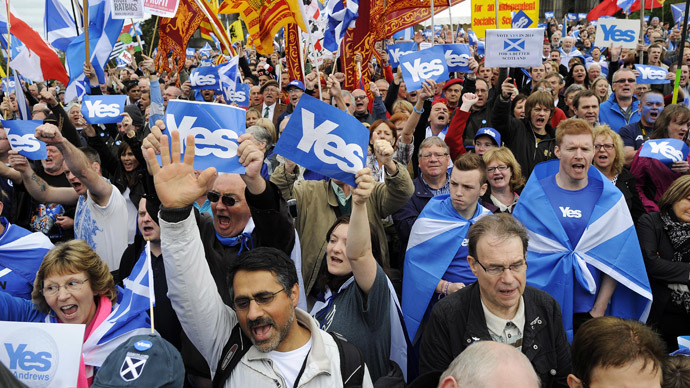‘Currency issue is used by Westminster to instigate fear among the Scots’

The independent currency would give Scotland the full levers of economic power without relying on London or the Central banks and allow it to pursue an entirely different economic agenda, Radical Independence Campaign co-founder Jonathan Shafi told RT.
RT:Alex Salmond was tripped up over the question of what currency Scotland would have if it went solo. Why the difficulty?
Jonathan Shafi: I think that the currency question is being used by the Westminster parties essentially to instigate fear among the Scottish population. If you look at the question of currency overall you have to see a couple of things. First, that it is not up to the Treasury, and certainly not to George Osborne, to say what currency Scotland would use, Scotland has every right to use a pound. The question is whether it will be part of the currency union. My own belief is that it would be inconceivable for the currency union not to take place in the event of a “yes” vote. But I also see something else; I see that actually we should be looking beyond the sterling zone. I think the independent currency would give us the full levers of economic power necessary without relying on London or the Central banks and that would allow us to pursue an entirely different economic agenda. But this is a process and I don’t think the currency bullying will work on the people of Scotland when it comes to the vote.
RT:One of the "Better together" campaign arguments is that 600,000 Scottish jobs could be up in the air if independence is achieved. Surely those are numbers worthy of consideration?
JS: If you look at the question of jobs as it presently exists in the UK, we are seeing the situation where a job is temporary in terms of contracts awarded, the pay is very low, jobs are insecure, and many people who leave universities can’t find jobs to meet their skills. There is not just unemployment, there is underemployment. Actually I think that the prospects for jobs and growth in jobs are far better and yes full. For example, we will invest huge amounts of money into new industries such as renewable energy, green industry. We want to see jobs which are not just there for a few months and then you having to move on, but jobs for life, dignified with trade union rights. We think these things are much better achieved in an economy that pays attention to manufacturing and in an economy which pays attention to skills and to rewarding skills, but importantly an economy that begins to put people first rather than the corporations because all we get from London is the buffeting corporate power and it’s about time that people power to put on the agenda, to put first the needs of the people.
RT:According to the Institute for Fiscal Studies, leaving the UK would mean an increase in taxes of around a grand a year. Are Scots prepared to pay that sort of amount for their independence?
JS: What we need to see in terms of taxes, we need to see a progressive taxation system. That means that the richer you are, the more tax you pay. If you look at what we have got, we have tax havens, we have super-rich. What I am talking about is that billionaires, millionaires, and many times over are avoiding taxes, that major British companies are avoiding and not paying their fair share of taxes. The question comes back to whether we need tax in the first place. We need tax in order to pay for public services, but what we have got to know just from the Westminster government is that they are attacking our public services, they are not just decimating it, they are destroying our public services and what we want to see is the defense of social security, defense of our world class welfare system and social services provision. But we think we can do it by taxing the rich. Why is that the ordinary people that should pay for the crisis caused by the bankers?
RT:Obviously you're pro-independence, but surely there are some benefits to staying together aren't there?
JS: I do not see any benefits, all I see are risks if we stay with the UK, which is we will continue further privatization, permanent austerity and we will be left with an ideological straightjacket which is Westminster. What we want is a completely different society; we want to see things radically altered in terms of democracy, in terms of economy and in terms of politics. And we think we have a better chance of doing that if we vote "Yes". I do not see any positives in staying with Westminster, and actually I think that many people in England would agree with that. If they were ever given an opportunity to get rid of Westminster and set up their own parliament which acted more in their interest I think they would take it as well.
The statements, views and opinions expressed in this column are solely those of the author and do not necessarily represent those of RT.
The statements, views and opinions expressed in this column are solely those of the author and do not necessarily represent those of RT.












